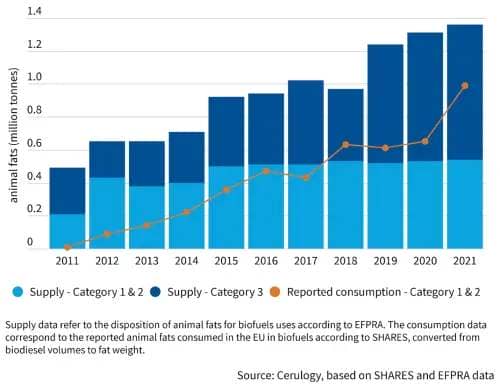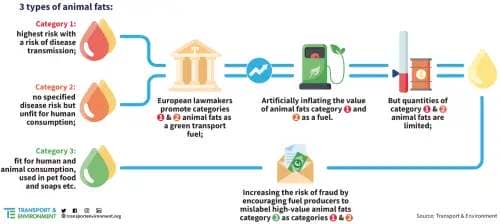Europe’s growing use of animal fats to power its cars and planes is becoming increasingly unsustainable, according to a new study by Cerulogy funded by European NGO Transport & Environment (T&E). The green group calls for greater transparency so that consumers know what is going into their tanks and fueling their flights.
Use of animal fat biodiesel has doubled in the past decade and is 40 times higher than it was in 2006. Demand for animal fats in biofuels is also projected to triple by 2030 compared to 2021 according to data collected by T&E from Stratas Advisors.
European lawmakers have been promoting the by-product of industrial meat farming as a way of reducing the carbon impact of transport fuels.They are now setting their sights on planes and to a lesser extent ships. However, there is not enough fat to go around.
Nearly half of all European animal fats already go into biodiesel, despite being used extensively in the pet food, soaps and cosmetics industries. With the burning of animal fat biofuels set to triple by 2030, there will not be enough to scale it up sustainably, warns T&E.
Airlines such as Ryanair and Wizz Air have recently struck large deals with oil suppliers for what are termed ‘sustainable aviation fuels’ (SAF). Details of the exact feedstocks used in SAFs are often vague. But projections obtained from Stratas Advisors, a consultancy, shows that animal fats are expected to be the most common waste feedstock used in SAFs, alongside used cooking oil. Like all waste biofuels, the availability of animal fats is limited. Scaling up industrial meat farming is neither doable nor desirable. A flight from Paris to New York needs 8,800 dead pigs, T&E’s calculations show. Applying the current 50% maximum blend of HEFA that can be certified, 4,400 dead pigs per flight would alternatively be needed.
This is particularly problematic for the pet food and soap and cosmetic industries who use animal fats extensively with few or no alternatives. Pet food makers have already warned that they will have to switch to “less sustainable options” such as palm oil, while soap and cosmetic producers will also most likely switch to palm as it is the cheapest option available.
In the most extreme case, where virgin palm oil substitutes animal fats in the oleochemicals industry (soaps, cosmetics), CO2 emissions of animal fats biofuels could be nearly twice as bad for the climate asconventional diesel.
The competing uses for animal fats lay bare the challenge of scaling up waste biofuels production. Animal fats don’t grow on trees. Pet food suppliers, for example, will now have to reduce the sustainability of their products by using palm oil instead. And as we have seen with used cooking oil, this also increases the risk of fraud. The potential mislabelling of animal fats suggests fraud could be taking place on an industrial scale.
—Barbara Smailagic, Fuels Policy Officer at T&E
Animal fats are divided into three categories. Categories 1 and 2 include animal fats that cannot be consumed by humans or animals, as they are poor quality or likely carry disease. These are normally only used in transport fuels and for heating. Category 3 animal fats are better quality and are used by a number of different industries.
The EU’s Renewable Energy Directive (RED) encourages the production of animal fats for transport fuels by allowing fuel suppliers to meet renewables targets with them. The RED prioritizes categories 1 and 2 for transport fuels by allowing them to count for double in meeting targets.
Animal fats consumption for biodiesel in the EU (SHARES and EFPRA data). Source: T&E
Last year, European countries reported consuming twice the amount of biofuels derived from the categories 1 and 2 as the animal fats industry reported producing. This suggests higher-grade category 3 animal fats are being mislabeled as categories 1 and 2, T&E said. As these animal fats are more valuable in transport fuels, there is a risk that producers and suppliers downgrade high quality animal fats to meet renewable transport targets. If this is being done deliberately it would represent fraud at an industrial level, warns T&E.
Illustration of potential animal fats fraud case. Source: T&E
T&E suggests the following recommendations to EU decision-makers and national authorities:
-
National authorities must cap the categories 1 and 2 to avoid further increase at national level, for example at their 2020 levels. Moreover, they should not deviate from the limit of 1.7% applied on biofuels part B of Annex IX – that includes animal fats category 1 and 2 and UCO. National authorities must exclude animal fats category 3 from the list of eligible biofuels in the national biofuels schemes.
-
The national authorities must also ensure that the limit and restrictions apply across all transport sectors, including aviation and shipping. ReFuel EU and Fuel EU maritime should not lead to even more demand for biofuels from animal fats or Used Cooking Oil. To ensure this, animal fats category 3 should be excluded from these Regulations (de facto there should be no incentives for their use) and the limit set on categories 1 and 2 in the RED should effectively apply.
-
The European Commission must investigate the potential risk of fraud in relation to the increased demand for animal fats for biofuels in the EU, derived from the existence of a differentiated policy treatment for the different categories of animal fats 1, 2 and 3.
-
The European Commission and national authorities must provide transparent and accessible numbers about the different types and quantities of animal fats used in biofuels, per fuel suppliers, as requested by the RED.
-
The European Commission and national authorities should ensure that the auditing systems put in place to prevent fraud are truly independent and robust. This should not be left to economic operators but instead should be a process that is overseen by an independent EU or national authority. It is also crucial that economic operators follow the correct classification of animal fats in their reporting and that sanctions are applied if that is not the case.




